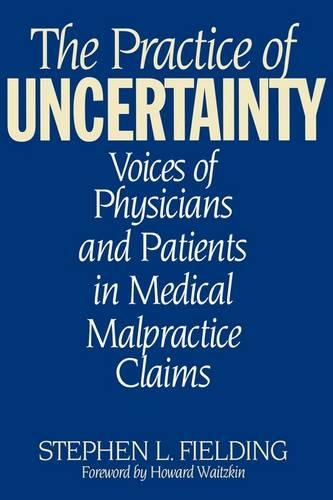
The Practice of Uncertainty: Voices of Physicians and Patients in Medical Malpractice Claims
(Hardback)
Publishing Details
The Practice of Uncertainty: Voices of Physicians and Patients in Medical Malpractice Claims
By (Author) Stephen L. Fielding
Bloomsbury Publishing PLC
Praeger Publishers Inc
30th April 1999
United States
Classifications
Tertiary Education
Non Fiction
Laws of specific jurisdictions and specific areas of law
344.73041
Physical Properties
Hardback
256
Description
Incorporating in-depth interviews, statistical data, and prior studies, Fielding illustrates how modern medicine is a victim of its own success. The historical record since the early 19th century shows that the rate of malpractice claims has increased as medicine developed new and more complex procedures. Fielding integrates macro- and micro-levels of analysis to explain how scientific medicine is inherently prone to adverse outcomes no matter how competent medical provides are and how patients often feel their personal experiences and views are marginalized during the course of their medical care. This combination makes it more likely that patients will sue when something goes wrong. The so-called medical practice crisis is mostly the result of a system of health care that has promoted professional dominance and high-tech care. This system both shapes and is shaped by the daily clinical context in which patients, physicians, and other providers interact. The key policy implication would be to place greater emphasis on primary care and prevention rather than curative or high-tech interventions. For example, aggressive programs to ensure primary care for all, public health, occupational health, and accident reduction would go a long way to improve both the health of the population and reduce the rate of medical malpractice claims.
Reviews
[P]rovides a thoughtful, unique analysis of the changing face of the American medical malpractice crisis.... Most importantly, as Fielding's unique work reminds us, physicians must rediscover the nurturing aspects of the physician-patient relationship through relationship-centered care, reclaiming their noble role as humanity's healers.-Journal of Legal Medicine
The strength of this book is its systematic and sympathetic treatment of the physical and psychological impact of medical injury and malpractice litigation on patients and physicians and the extent to which physicians' behavior can precipitate or defuse a potential claim. The book also provides an accessible overview of the evolution of the U.S. medical and malpractice systems.-Health Affairs
"Provides a thoughtful, unique analysis of the changing face of the American medical malpractice crisis.... Most importantly, as Fielding's unique work reminds us, physicians must rediscover the nurturing aspects of the physician-patient relationship through relationship-centered care, reclaiming their noble role as humanity's healers."-Journal of Legal Medicine
"[P]rovides a thoughtful, unique analysis of the changing face of the American medical malpractice crisis.... Most importantly, as Fielding's unique work reminds us, physicians must rediscover the nurturing aspects of the physician-patient relationship through relationship-centered care, reclaiming their noble role as humanity's healers."-Journal of Legal Medicine
"The strength of this book is its systematic and sympathetic treatment of the physical and psychological impact of medical injury and malpractice litigation on patients and physicians and the extent to which physicians' behavior can precipitate or defuse a potential claim. The book also provides an accessible overview of the evolution of the U.S. medical and malpractice systems."-Health Affairs
Author Bio
STEPHEN L. FIELDING is Research Assistant Professor in the Department of Family Medicine at the University of Rochester School of Medicine and Dentistry where he is managing several research projects on women's reproductive health./e In addition to conducting his work on medical malpractice, he spent a year at the Harvard School of Public Health in 1988, where he worked on a major study of patients' socioeconomic status and hospitalization. From 1990 to 1991 he conducted research at Brandeis University on emergency room utilization in Indonesia, and taught at the State University of New York at Geneseo from 1991 to 1997.
